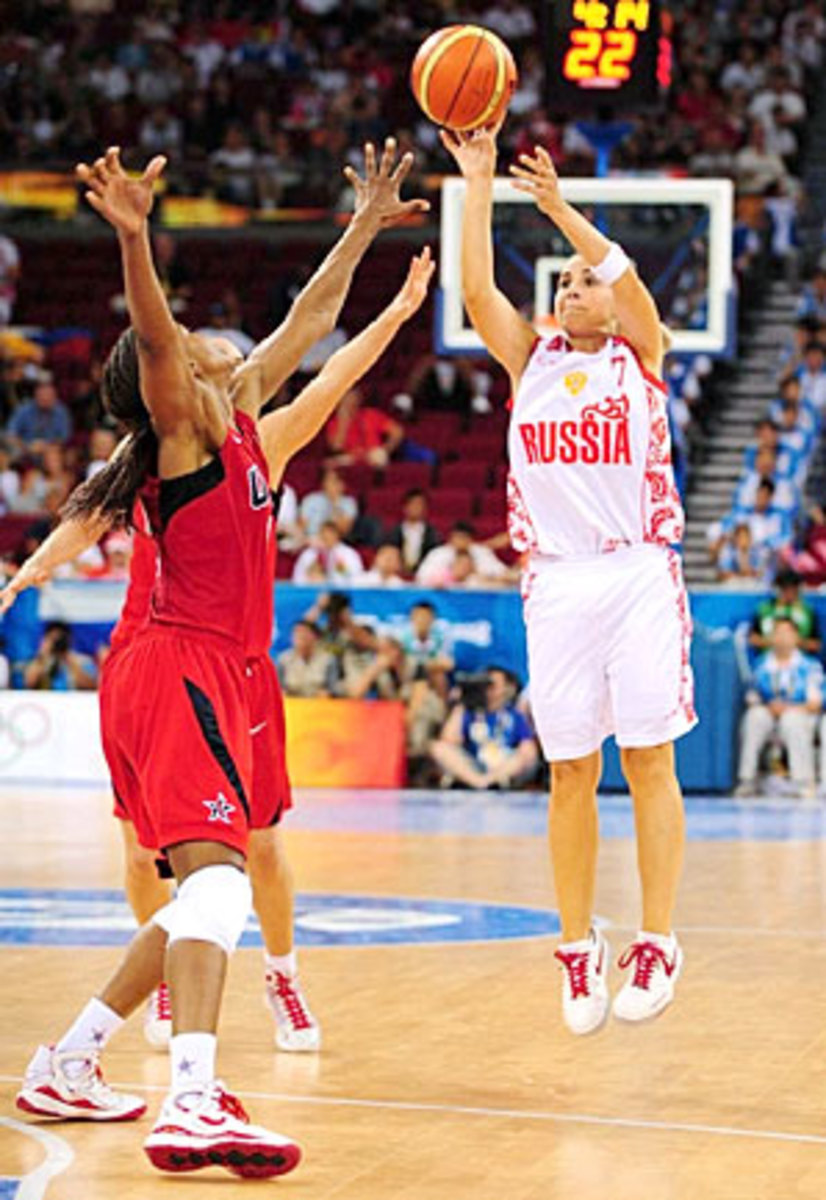
Defense propels U.S. women to another gold clash with Australia
BEIJING -- As soon as the U.S. and Russian women's basketball teams had listened to their national anthems before the start of Thursday's first Olympic semifinal, they jogged toward each other to exchange gifts. But Becky Hammon, the U.S.-born point guard who had stood in her Russian uniform with her hand over her heart for The Star-Spangled Banner, couldn't find a seam. She couldn't find an open hand to place her red stuffed toy in exchange for a blue USA cap -- until Katie Smith obliged as the last U.S. player in line.
That's how early the Americans' defensive effort started their 67-52 win. And the U.S. team needed every stop it could get through a horrendous first half of offense. After shooting better than 50 percent from the field -- and blowing out teams by an average of 43 points -- through their first six Olympic games, the Yanks were suddenly launching bricks, blowing layups and fluffing free throws, all while the pro-Russia crowd booed and whistled their every possession. With most of the first half gone, the U.S. was shooting 25 percent at the free throw line, and that mark was actually better than its two-point field goal clip of 24 percent.
The offensive fiasco -- and the hostile crowd -- was eerily reminiscent of the Americans' loss to Russia in the semifinals of the 2006 world championships in Brazil. This time, however, the team defense came through. After eking out a 33-32 lead in the first half, the U.S. held Russia to 20 points and 25 percent shooting. Hammon, who had been Russia's top scorer going into the game (13.2 ppg), scored just three points, and all of them came in the fourth quarter.
"I think we were almost too pumped at the start of the game. We couldn't catch the ball," U.S. assistant coach Mike Thibault said. "We were trying to do everything too fast. Once we slowed down and took a deep breath, we got that little run at the end of the second quarter, we got the lead back. At halftime, we relaxed a little bit. We weren't playing like that little hamster on a wheel."
Good team defense allowed the U.S. players to exhale.
"We knew we'd have nights where we'd struggle offensively," Thibault said. "But if we could become a really good defensive team, we could play through bad stretches of offense. When we played in the world championships two years ago, we didn't do either well. We just weren't a good defensive team. Defense has been the emphasis of practice two-thirds of the time here."
In the gold medal game on Saturday, the U.S. will have a familiar foe in Australia, which beat host China 90-56 in the second semifinal despite the absence of star forward Penny Taylor, who sat out with an ankle injury. (She is expected to suit up for the gold medal game.) This will be the third straight time these two teams have met in the Olympic final; the U.S. won those finals in 2000 and 2004, and is, in fact, 13-0 vs. Australia in Olympics or world championship games.
In eight years since their first Olympic final in Sydney when Lauren Jackson accidentally -- and memorably -- yanked out Lisa Leslie's hair extension in an emotionally charged game, a few things have changed. Dawn Staley is on the bench as a coach, not on the floor as a player for the U.S. Leslie has a daughter named Lauren. ("I'm sure she wasn't named after me," Jackson said.) And Australia now has a world championship (in 2006) to its credit.
"I don't think there's too much difference between the two teams these days," Aussie guard Tully Bevilaqua said. "We match each other physically, and we're not intimidated by the U.S. anymore. We both run structured offenses. It's going to come down to things like rebounding and defense."
And depth. With superstars like Candace Parker, Tamika Catchings, Seimone Augustus and Sylvia Fowles coming off the bench, the U.S. is far deeper than it was four years ago in Athens.
"It's not even close," said U.S. assistant coach Gail Goestenkors, who was on the staff in Athens. "When the starters go out, we gain, really. That's our greatest advantage. Other teams have great players, but they don't have 12. I'd say all but one game, when our bench has come in, they've raised our level of play. Because the other team's starters have started to wear down."
Australia has other concerns: Taylor, if she plays, won't likely be at full strength, and Jackson has been enduring a nagging ankle injury that will require surgery as soon as the Games are over.
"It's going to be a real toughie for us, but tough for them, too," Aussie coach Jan Stirling said. "We have to stop their running game, stop their three-point shooting ... obviously their power game is a bit of an issue for us. We're going to have to pull out a big A-game to get over them."
The U.S. will have to be at its best, too. But after surviving the game against Russia despite a forgettable night on offense, the U.S. players are confident they can withstand whatever Australia throws at them.
"It's easy to win games when you're making shots and everything is going your way," said Diana Taurasi, who had nine rebounds and led all scorers with 21 points against Russia. "When things aren't working and you still find a way to win, that shows you're pretty good as a squad."





